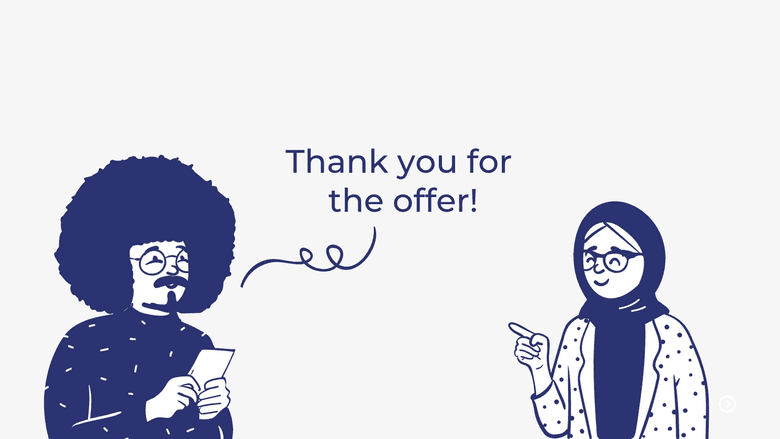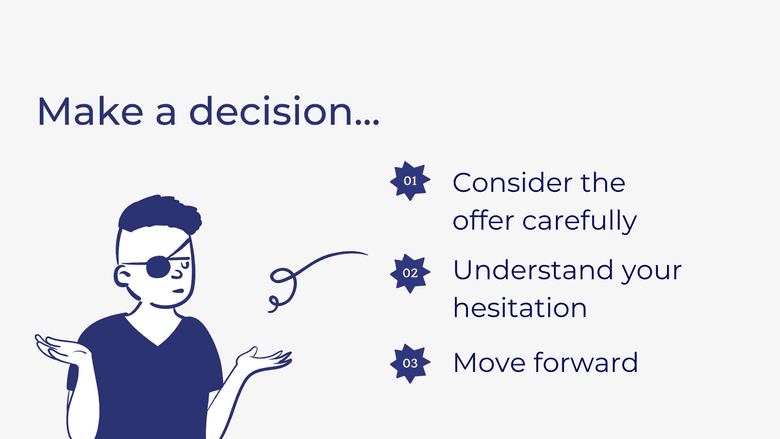How to Respond to a Job Offer Like a Pro
The job interview process was tough, but you have a job offer. Now what?
After you’ve let the job offer sink in, you’ll want to confirm you received it with the recruiter or hiring manager who will be eager to hear back from you. Here’s how to respond to a job offer and negotiate your salary and other benefits with confidence.
Acknowledge the Offer

If you’re offered an opportunity with a phone call, thank the recruiter and ask them to follow up with an email. That way, you have the offer in writing and can review it on your own time. If the offer comes via email, acknowledge it with a quick response. Confirm that you’re excited to read and consider the proposal and you’ll come back to them with a decision.
Be sure to ask the recruiter if there’s a deadline for your response. While recruiters will likely want an answer quickly, you must have enough time to review the offer before making a decision. Even if it’s your dream role, it’s sensible to give yourself time to consider any questions you might have or whether to negotiate aspects of the offer.
Negotiate and Make a Decision

With an official offer on the table, it’s time to decide whether to accept, negotiate, or decline.
Thoroughly consider the offer in front of you
- Is this the right role for you?
- Does it offer everything you were looking for?
- Should you negotiate on salary and benefits?
If you’re happy with the deal that’s on the table, you can skip ahead to sending a written acceptance of the offer.
Understand what's holding you back
If you’re still considering the opportunity, don’t be afraid to approach the recruiter or hiring manager again. Ask for additional information about the job description, the team, and the company you’d be joining. Once you have a better feel for the role and the company, you may feel more inclined to accept or decline the terms of the offer.
In many cases, the new job is a great fit and one you’re excited about accepting. But there might be something that’s holding you back. Maybe the salary is below what you were expecting, or you believe you provide greater value than the offer.
It could be that the company’s proposal doesn’t mention benefits or equity, something that you’re keen to explore. In this case, the best option is to make a counteroffer and enter salary and benefits negotiations with the recruiter. Our guide on salary negotiations can help you formulate your value, make a request that feels comfortable, and negotiate with confidence.
Move forward with the process
Once you’ve made a decision and negotiations are complete, you can formally respond to the written offer with either an acceptance or non-acceptance letter. Remember, you can still change direction even after you’ve accepted the offer. If you discover the role isn’t a great fit for you later in the hiring process, you can renege on the job offer politely and keep your options open.
How to Provide Your Decision

Accepting a Job Offer
By now, you’ll have sent an early acknowledgment of the job offer, but it’s time to follow up with a formal acceptance.
It’s best to make this confirmation in writing. It’s up to you whether you’d like to write a letter or send an email. If you’ve been negotiating or communicating via email, it often makes sense to continue the conversation there.
You’ll want to keep your email or letter concise and focused on your acceptance. Avoid anything that sounds ambiguous — if you’re unclear on any specifics, discuss this before you hit send. Here’s what to include in your email or letter to your new employer:
- Your acceptance of their job offer
- Confirm your terms of employment, including salary, job title, benefits, and equity
- Confirm your start date
- Your appreciation and excitement about the opportunity
It’s crucial to include any health, education, or other benefits that you’ve negotiated here, so it’s clear which version of the offer you’re accepting. Include your phone number within your letter or email signature, too, so the recruiter can easily reach you if they’d like to clarify anything.
Declining a Job Offer
Sometimes the role just isn’t right for you, or you’ve been offered your dream job at another company. If that’s the case, you’ll want to decline the job offer politely and offer your appreciation.
Keep your non-acceptance letter or email short and sweet, making it clear you won’t be taking on the role. You can share the reasons why if you feel comfortable doing so, but you don’t have to. If you’re declining the position because the company was unwilling to negotiate salary and benefits, mentioning this may make them reconsider if they don’t want to lose you. Reiterate your thanks to the recruiter, interviewing panel, and company for their time and consideration.
How to Respond to a Job Offer: Email Samples

Accepting a job offer is a significant career move, so it's understandable you want to take that first step with confidence. Here are some email samples to give you an idea of what to write to your new employer. As emails are less formal, you don’t need to include your full name or address. If you're sending a job acceptance letter instead, keep the messaging and follow formal letter etiquette when it comes to addresses and sign-offs.
Example #1: Simple Job Offer Acceptance Email
If you’re happy to accept the job as offered and haven’t entered negotiations, this job offer email sample is a useful template. It covers all the basics and makes it clear you’re excited to join the company.
Data Engineer Manager Job Acceptance - Mark Garci
Dear Mr. Wallace,
Thank you for your call on Monday with your offer for the Data Engineer Manager role. After reviewing the offer and terms of employment, I’m happy to accept your offer of employment.
As per the stated terms, my base salary will be $135,000, with a $30,000 bonus and three weeks paid vacation. I’m comfortable with the health and other benefits detailed within the offer.
I look forward to joining the team on my start date of March 1st and working with you on your exciting plans for the year ahead.
If there’s anything further I can help with, please don’t hesitate to email or call me at (555) 123-4567
Best wishes,
Mark
Example #2: Negotiated Job Offer Acceptance Email
When you’ve successfully negotiated an enhanced salary or benefits package, you’ll want to make sure this is included in your job offer acceptance email. That way, both you and the recruiter are clear about the terms to which you’re agreeing. Here’s a sample email that covers this scenario.
Blake McConnell — Job Acceptance Confirmation
Dear Mrs. Harrison,
Thank you for your time in discussing this opportunity with me and talking over aspects of the offer. I’d like to formally accept your offer for the role of Customer Solutions Engineer and join the company, with my first day being March 1st.
As we discussed by email and confirmed on the call, my starting salary will be $110,000, with a signing bonus of $50,000 and $15,000 equity per year. We also discussed the inclusion of healthcare, dental, and vision benefits from my start date. You also confirmed the company is happy to accommodate remote working once a week, with an equipment allowance included.
It looks to be an exciting year for [Company Name], and I look forward to being part of this.
Please send any paperwork to be signed and let me know if there’s anything further you need from me at this stage.
Best,
Blake
Example #3: Job Offer Non-Acceptance Email
If you’ve had a more promising offer from another company or simply decided this job isn’t for you, it’s time to send a quick email or thank you letter to confirm you’re declining the offer. Here’s a sample email that keeps the message clear and concise.
Thank you for the job offer.
Dear Mr. Yang,
Thank you for your offer for the role of Product Manager with [Company Name]. I’ve taken some time to reflect on my next move. With this in mind, I have decided this role is not a good fit for my goals at present.
I wish you all the best with the future and look forward to keeping up with what [Company Name] shares with the tech world.
Best,
Clara
Navigate Your Career With Confidence
Receiving a job offer is an exciting moment. It’s also an excellent opportunity to pause and consider if you can negotiate a better deal, and how to respond to a job offer with enthusiasm and purpose.
Whether you’re accepting a job offer with your dream company or you’re in the middle of the negotiation process, knowing what steps to take will help you communicate with confidence and move forward with your career goals.
The information provided herein is for general informational purposes only and is not intended to provide tax, legal, or investment advice and should not be construed as an offer to sell, a solicitation of an offer to buy, or a recommendation of any security by Candor, its employees and affiliates, or any third-party. Any expressions of opinion or assumptions are for illustrative purposes only and are subject to change without notice. Past performance is not a guarantee of future results and the opinions presented herein should not be viewed as an indicator of future performance. Investing in securities involves risk. Loss of principal is possible.
Third-party data has been obtained from sources we believe to be reliable; however, its accuracy, completeness, or reliability cannot be guaranteed. Candor does not receive compensation to promote or discuss any particular Company; however, Candor, its employees and affiliates, and/or its clients may hold positions in securities of the Companies discussed.
